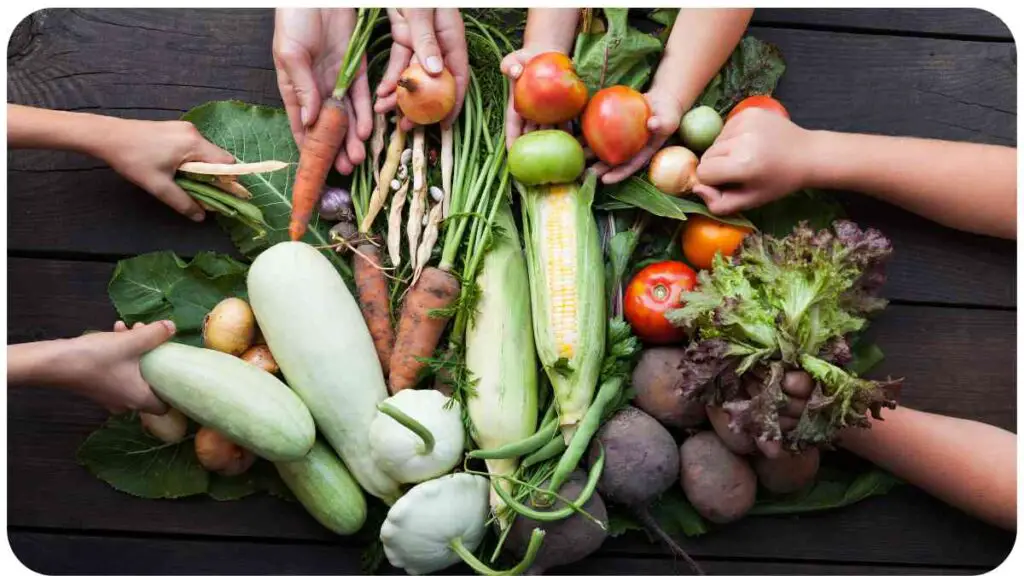Welcome to the ultimate resource for vegan parents! Raising children on a vegan diet is a rewarding journey filled with unique challenges and opportunities. In this comprehensive guide, we’ll explore everything you need to know about vegan parenting, from understanding the basics of veganism to practical tips for raising happy, healthy kids.
| Key Takeaways |
|---|
| 1. Embrace the journey of vegan parenting with openness and curiosity. |
| 2. Prioritize balanced nutrition by incorporating a variety of nutrient-rich plant foods into your child’s diet. |
| 3. Foster values of compassion and sustainability through experiential learning and leading by example. |
| 4. Seek support and guidance from the vibrant vegan parenting community for encouragement and insights. |
| 5. Remember that every meal served with love and every lesson taught with compassion is a step towards raising happy, healthy, and compassionate vegan kids. |
2. Understanding Veganism and Parenting

Before diving into the specifics, let’s clarify what veganism entails and how it intersects with parenting. Veganism is not just about dietary choices; it’s a lifestyle rooted in compassion for animals, environmental sustainability, and personal health. As vegan parents, we strive to instill these values in our children while providing them with nutritious and delicious plant-based meals.
Embracing veganism as a family fosters empathy and understanding in children” The Ultimate Guide to Vegan Parenting provides valuable insights into nurturing compassionate minds.
3. Benefits of Raising Vegan Kids
Research shows that a well-planned vegan diet can meet all of a child’s nutritional needs and offer numerous health benefits. Vegan children tend to have lower rates of obesity, heart disease, and certain types of cancer. Additionally, raising vegan kids promotes empathy towards animals and encourages environmentally-friendly behaviors.
4. Essential Nutrients for Vegan Children

Table: Nutrient-Rich Vegan Foods
| Nutrient | Food Sources |
|---|---|
| Protein | Lentils, tofu, quinoa, nuts |
| Calcium | Kale, broccoli, fortified plant milk |
| Iron | Spinach, lentils, chickpeas |
| Vitamin B12 | Fortified cereals, nutritional yeast |
| Omega-3 Fatty Acids | Flaxseeds, chia seeds, walnuts |
Ensuring that your child receives an adequate intake of essential nutrients is crucial for their growth and development. Incorporating a variety of nutrient-rich plant foods into their diet is key.
Discover the myriad benefits of nourishing your children with plant-based goodness” 10 Surprising Benefits of Raising Your Kids on a Vegan Diet sheds light on the advantages of a vegan lifestyle for young ones.
5. Meal Planning Tips for Vegan Families
One of the cornerstones of successful vegan parenting is effective meal planning. By thoughtfully designing weekly menus, you can ensure that your children receive a balanced diet that meets their nutritional needs. Here are some tips to help you navigate mealtime:
- Diversify Your Plate: Aim to include a variety of fruits, vegetables, whole grains, legumes, and plant-based proteins in every meal. This not only ensures adequate nutrition but also introduces your child to a wide range of flavors and textures.
- Get Creative with Recipes: Don’t be afraid to experiment with new ingredients and cooking techniques. There are countless vegan recipes available online, ranging from simple and kid-friendly to gourmet and adventurous. Get your kids involved in the kitchen and let them unleash their culinary creativity.
- Batch Cooking and Freezing: Save time and stress by preparing large batches of staple foods such as grains, beans, and sauces in advance. Portion them out and freeze them for quick and convenient meals throughout the week. This is especially helpful on busy days when cooking from scratch isn’t feasible.
- Supplement Wisely: While a well-planned vegan diet can provide most essential nutrients, some may require supplementation, such as vitamin B12 and vitamin D. Consult with a healthcare professional to determine if supplements are necessary for your child and choose high-quality, vegan-friendly options.
Table: Sample Weekly Meal Plan for Vegan Kids
| Day | Breakfast | Lunch | Dinner |
|---|---|---|---|
| Monday | Oatmeal with berries | Chickpea salad wrap | Lentil stew with brown rice |
| Tuesday | Smoothie bowl | Peanut butter and jelly sandwich | Vegetable stir-fry with tofu |
| Wednesday | Avocado toast | Quinoa salad | Spaghetti with marinara sauce |
| Thursday | Vegan pancakes | Hummus and veggie wrap | Black bean tacos |
| Friday | Chia pudding | Lentil soup | Veggie burger and sweet potato fries |
| Saturday | Tofu scramble | Vegetable sushi rolls | Cauliflower curry |
| Sunday | Breakfast burrito | Buddha bowl | Vegan pizza |
6. Addressing Concerns and Challenges
While there are many benefits to raising vegan kids, it’s essential to acknowledge and address potential concerns and challenges that may arise along the way. Here are some common worries and strategies for overcoming them:
- Nutritional Concerns: One of the most significant concerns surrounding veganism is whether children can obtain all essential nutrients from plant-based sources alone. With proper planning and knowledge, it’s entirely possible to meet your child’s nutritional needs on a vegan diet. Focus on incorporating a variety of nutrient-dense foods into their meals, and consider consulting a registered dietitian for personalized guidance.
- Social Pressures: Navigating social situations can be tricky, especially when your child is the only vegan among their peers. Educate your child about their dietary choices and empower them to confidently express their preferences to friends, family, and teachers. Additionally, provide them with vegan-friendly snacks and treats to bring to social gatherings, ensuring they feel included and supported.
- Family Dynamics: In families where not everyone follows a vegan diet, conflicts may arise regarding meal choices and food preferences. Open communication and compromise are key to maintaining harmony. Find common ground by preparing meals that accommodate both vegans and non-vegans, and encourage respectful discussions about dietary differences.
Prioritize your family’s health and well-being by embracing vegan parenting” Why Vegan Parenting Is the Best Choice for Your Family’s Health emphasizes the positive impact of veganism on familial health.
7. Tips for Navigating Social Situations
Social gatherings and events can present unique challenges for vegan families, but with a bit of preparation and flexibility, you can navigate these situations with ease. Here are some tips to help you and your child feel comfortable and included:
- Communicate in Advance: If you’re attending a gathering where food will be served, reach out to the host ahead of time to discuss your dietary preferences and any accommodations that may be needed. Offer to bring a dish to share that aligns with your child’s vegan diet, ensuring there will be something they can enjoy.
- BYOS (Bring Your Own Snacks): Always carry a stash of vegan-friendly snacks when you’re out and about. This way, you’ll have something to munch on in case there are limited options available. Portable snacks like trail mix, fruit, energy bars, and veggie sticks are perfect for staving off hunger while on the go.
- Lead by Example: Use social gatherings as an opportunity to showcase the deliciousness of vegan food. Bring along homemade treats or share recommendations for vegan-friendly restaurants in the area. By demonstrating that veganism is both enjoyable and accessible, you may inspire others to explore plant-based options.
- Educate Without Preaching: Be prepared to field questions about your child’s vegan diet with patience and grace. Keep your responses informative but non-confrontational, focusing on the health, environmental, and ethical reasons behind your family’s dietary choices. Remember that leading by example is often more impactful than trying to persuade others.
8. Instilling Values of Compassion and Sustainability
One of the most significant benefits of raising vegan kids is the opportunity to instill values of compassion and sustainability from a young age. By teaching your children to respect all living beings and care for the planet, you’re shaping them into conscientious and empathetic individuals. Here are some ways to cultivate these values:
- Educate Through Experience: Take your child on field trips to animal sanctuaries, where they can interact with rescued animals and learn about their stories. Seeing animals up close and personal helps children develop empathy and understanding for their fellow creatures.
- Empower Them to Make a Difference: Encourage your child to participate in age-appropriate activism and advocacy efforts. Whether it’s writing letters to lawmakers, organizing fundraisers for animal welfare organizations, or volunteering at local environmental clean-up events, empowering them to take action fosters a sense of agency and responsibility.
- Lead by Example: Children learn by example, so be mindful of the values you’re modeling in your everyday actions. Show kindness and compassion towards all living beings, practice sustainable habits like recycling and reducing waste, and prioritize ethical consumption choices. Your child will internalize these behaviors and carry them into adulthood.
- Foster Connection with Nature: Spending time outdoors and connecting with nature is essential for cultivating a sense of environmental stewardship. Take family hikes, plant a garden together, or simply enjoy picnics in the park. Encourage your child to appreciate the beauty and biodiversity of the natural world, instilling in them a deep respect for the planet.
Empower your children with knowledge about veganism and animal rights” 15 Simple Ways to Teach Your Kids About Veganism and Animal Rights offers practical strategies for educating young minds.
9. Vegan Recipes for Kids

Making delicious and nutritious meals for your vegan kids doesn’t have to be complicated or time-consuming. Here are some quick and easy recipes that are sure to please even the pickiest eaters:
Table: Quick and Easy Vegan Recipes for Kids
| Recipe | Ingredients | Instructions |
|---|---|---|
| Vegan Mac and Cheese | Elbow macaroni, cashews, nutritional yeast, carrots, potatoes, garlic powder | 1. Cook macaroni according to package instructions. 2. In a blender, combine cashews, nutritional yeast, cooked carrots, potatoes, and garlic powder until smooth. 3. Toss cooked macaroni with the creamy sauce. Enjoy! |
| Chickpea Nuggets | Chickpeas, breadcrumbs, flour, spices | 1. Preheat oven to 375°F (190°C). 2. Drain and rinse chickpeas, then mash them in a bowl. 3. Add breadcrumbs, flour, and spices to the mashed chickpeas and mix well. 4. Form mixture into nugget shapes and place on a baking sheet. 5. Bake for 25-30 minutes, flipping halfway through, until golden brown and crispy. |
| Veggie Quesadillas | Tortillas, black beans, bell peppers, onions, vegan cheese | 1. Heat a non-stick skillet over medium heat. 2. Place a tortilla in the skillet and layer with black beans, bell peppers, onions, and vegan cheese. 3. Top with another tortilla and cook until golden brown on both sides. 4. Slice into wedges and serve with salsa or guacamole. |
| Banana Berry Smoothie | Bananas, mixed berries, spinach, almond milk, maple syrup (optional) | 1. Blend bananas, mixed berries, spinach, and almond milk until smooth. 2. Add maple syrup to taste if desired. 3. Pour into glasses and enjoy as a refreshing breakfast or snack. |
10. Vegan Parenting Community and Support
Navigating the world of vegan parenting can feel overwhelming at times, but you’re not alone. There’s a vibrant community of like-minded individuals who are eager to offer support, share resources, and connect with fellow vegan families. Here are some ways to tap into this supportive network:
- Join Online Forums and Groups: Platforms like Facebook, Reddit, and online forums dedicated to veganism and parenting are excellent resources for finding support and camaraderie. Join groups specifically geared towards vegan parents, where you can ask questions, share advice, and bond over shared experiences.
- Attend Vegan Events and Meetups: Keep an eye out for local vegan events, meetups, and potlucks in your area. These gatherings provide opportunities to connect with other vegan families, swap recipes, and form lasting friendships. Check community bulletin boards, social media, and local vegan organizations for event listings.
- Follow Vegan Parenting Blogs and Influencers: Many vegan bloggers and social media influencers share their experiences and insights into vegan parenting. Follow their blogs, YouTube channels, and social media accounts for inspiration, recipe ideas, and practical tips. Engage with their content, ask questions, and share your own journey to become part of the online vegan parenting community.
- Attend Vegan Festivals and Expos: Vegan festivals and expos are excellent places to meet like-minded individuals and discover new products and resources for vegan families. Attend workshops, cooking demonstrations, and panel discussions to deepen your knowledge and connect with experts in the field.
Ensure your kids enjoy tasty and nutritious snacks with these vegan options” The Top 10 Vegan-Friendly Snacks for Kids presents delicious and healthy snack ideas suitable for children.
11. Raising Vegan Kids: FAQs
As vegan parents, you may encounter a variety of questions and concerns from friends, family members, and even strangers. Here are some common FAQs about raising vegan kids, along with succinct answers to help you navigate these conversations with confidence:
- Q: Where do vegan children get their protein?
- A: Vegan children can get plenty of protein from plant-based sources such as lentils, tofu, quinoa, nuts, and beans.
- Q: Is it safe for children to follow a vegan diet?
- A: Yes, a well-planned vegan diet can meet all of a child’s nutritional needs and offer numerous health benefits.
- Q: Don’t vegan kids miss out on important nutrients like calcium and vitamin B12?
- A: Vegan children can obtain calcium from sources like kale, broccoli, and fortified plant milk, while vitamin B12 can be found in fortified cereals and nutritional yeast.
- Q: How can I ensure my child’s vegan diet is balanced and nutritious?
- A: Focus on incorporating a variety of whole, plant-based foods into their diet, including fruits, vegetables, grains, legumes, and nuts. Consider consulting a registered dietitian for personalized guidance.
12. Conclusion
Raising vegan kids is a fulfilling and empowering journey that allows you to nourish your children’s bodies, minds, and hearts while making a positive impact on the world. By providing them with wholesome plant-based meals, instilling values of compassion and sustainability, and connecting with the vibrant vegan parenting community, you’re setting them up for a lifetime of health, empathy, and environmental stewardship.
Remember, every meal served with love and every lesson taught with compassion is a step towards raising happy, healthy, and compassionate vegan kids.
In closing, embrace the adventure of vegan parenting with an open heart and a sense of curiosity. Celebrate the joy of discovering new flavors, sharing meaningful experiences, and nurturing a deep connection with the world around you. Together, we can create a brighter, more compassionate future for our children and generations to come.
Further Reading
- Vegan Parenting Guide: This comprehensive guide offers valuable insights and practical tips for parents navigating the world of veganism and parenting. From meal planning to addressing common concerns, this resource covers it all.
- Raising Vegan Children: Tips and Advice: Explore this informative article for expert tips and advice on raising vegan children. Discover strategies for ensuring balanced nutrition, addressing social challenges, and fostering values of compassion and sustainability.
- The Smart Parent’s Guide to Raising Vegan Kids: Delve into this insightful book for practical guidance on raising vegan kids with confidence. From debunking myths to providing evidence-based nutrition advice, this guide is a must-read for vegan parents.
FAQs
How can I ensure my child gets enough protein on a vegan diet?
Vegan children can obtain ample protein from plant-based sources such as lentils, tofu, quinoa, nuts, and beans.
Is it safe for children to follow a vegan diet?
Yes, a well-planned vegan diet can meet all of a child’s nutritional needs and offer numerous health benefits.
What are some common nutritional concerns for vegan children?
Common nutritional concerns include obtaining sufficient calcium, vitamin B12, iron, and omega-3 fatty acids. However, these nutrients can be easily sourced from plant-based foods and supplements.
How can I address concerns from friends and family about my child’s vegan diet?
Educate friends and family about the nutritional adequacy and benefits of a well-planned vegan diet. Share resources, recipes, and personal experiences to alleviate concerns and foster understanding.
Are there any resources available to support vegan parents?
Yes, there are numerous online forums, social media groups, and parenting books dedicated to supporting vegan families. These resources offer guidance, community, and practical tips for navigating the journey of vegan parenting.

Hi! My name is Hellen James, and I’m a vegan lifestyle enthusiast. I’ve been living the vegan lifestyle for over 10 years now, and it’s been one of the best decisions I’ve ever made. The food is amazing, the community is incredible, and there’s no way I could go back after experiencing all this firsthand.


